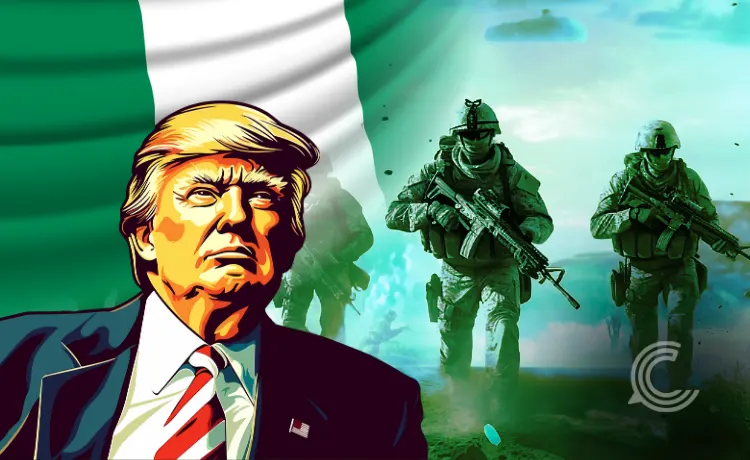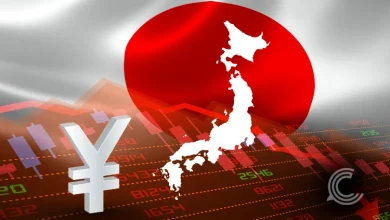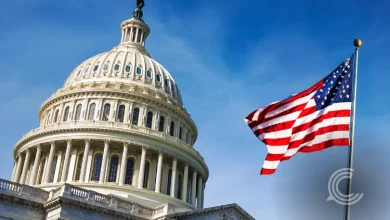Donald Trump Issues Military Warning After Christian Killings

Key Points:
- President Donald Trump stated that the U.S. “could be” considering sending U.S. troops on the ground or launching air strikes in Nigeria
- The President explicitly warned that all U.S. aid and assistance to Nigeria will cease immediately if the government fails to crack down on the violence
- The threat follows the U.S. decision to redesignate Nigeria as a “Country of Particular Concern” for alleged severe violations of religious freedom
U.S. President Donald Trump has escalated pressure on Nigeria, indicating that military options, including air strikes or the deployment of U.S. troops, are on the table to address what he describes as the mass killing of Christians in the West African nation.
The rhetoric signals a significant potential shift in U.S.-Nigeria relations, currently focused primarily on security cooperation and aid.
Unprecedented Warning of Intervention
Speaking to reporters aboard Air Force One on Sunday, President Trump was asked whether his previous threat of swift military action in Nigeria included sending troops or using air power. His response was unambiguous: “Could be. I mean, other things. I envisage a lot of things. They’re killing the Christians and killing them in very large numbers.We’re not going to allow that to happen,” as reported by the Associated Press.
This statement follows a weekend of intense diplomatic tension, ignited by the President’s post on his Truth Social platform, where he warned the U.S. could go in “guns-a-blazing” to “completely wipe out the Islamic Terrorists.” He also stated he had instructed the “Department of War” (referring to the Department of Defense) to prepare for possible action.
Nigeria Designated a Religious Freedom Violator
The threat of military intervention came just days after the U.S. administration added Nigeria back to its list of “Countries of Particular Concern” (CPC) under the International Religious Freedom Act. This designation applies to nations that have engaged in or tolerated “particularly severe violations of religious freedom.”
President Trump asserted that Christianity in Nigeria faces an “existential threat” from “radical Islamists.” While various extremist groups like Boko Haram and ISWAP operate in Nigeria, analysts note that the violence is often indiscriminate, victimizing both Christians and Muslims, and frequently stems from complex issues like resource conflicts and ethnic rivalries, as stated by experts to outlets such as The Jerusalem Post.
Abuja’s Response and Sovereignty Concerns
The Nigerian government, while committed to fighting terrorism, has responded cautiously but firmly to the U.S. threat. Nigerian President Bola Ahmed Tinubu’s spokesman, Daniel Bwala, pushed back on the characterisation of the country as religiously intolerant.
Bwala said that “Nigeria welcomes U.S. support to fight terrorism as long as it respects our territorial integrity.” He sought to downplay the extreme rhetoric, suggesting the President’s social media posts were a unique communication style intended to “force a sit-down between the two leaders so they can iron out a common front to fight their insecurity.”
Nigeria is Africa’s most populous nation and a critical U.S. partner in counter-terrorism efforts in the region. The relationship traditionally involves security assistance, intelligence sharing, and military training, not direct intervention by U.S. troops.
Strategic Implications for West Africa
Any deployment of U.S. troops or air strikes in Nigeria would represent a major, risky escalation of U.S. military involvement in West Africa. The current U.S. military footprint in the region was already significantly diminished following the withdrawal of troops from neighboring Niger last year, complicating any potential large-scale operation against dispersed militant groups.
Security experts suggest that targeted air strikes would be challenging against small, mobile groups scattered across large territories. Furthermore, cutting off U.S. aid, which includes humanitarian assistance and security cooperation, could be counterproductive, potentially weakening the Nigerian military’s capacity to fight extremism, according to analysis reported by The Indian Express. The threat puts immense pressure on the Nigerian government to demonstrate immediate and effective action to protect all citizens, regardless of faith, in order to avert a major diplomatic and potential military crisis.
The situation remains fluid, with the international community closely watching whether the U.S. follows through on the threat of deploying U.S. troops or whether the rhetoric is a negotiating tactic to secure Nigerian compliance on religious freedom issues.



